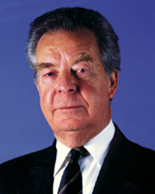Lord Imbert, pictured, who died in November 2017 at the age of 84, was one of the editorial board of Professional Security when I joined the magazine; and to learn that he has died has been difficult to take in. I only knew him through the magazine, as an old man; it took an effort that was beyond me to see the younger and very, very capable policeman that he had been. The closest I came to appreciating his earlier work was a book about the Balcombe Street siege in 1975. To cut a long story short – and the siege lasted six days – IRA terrorists cornered in central London held a couple hostage in a room; eventually talked out by Peter Imbert.
In days of mobile phones and jihadists who shoot and stab to kill until they are killed, such days feel far away. But don’t fall for the error that those times of Irish republican bombers and bank robbers were somehow more gentlemanly or quaint even, than now. For that, see for example Bombs have no pity: My war against terrorism, by Lieut Colonel George Styles GC, a 1975 memoir. The Association of Security Consultants (ASC) can better say than I what a long-standing and interested patron he was of the ASC, giving his name to an annual award that he took pains over judging. Though he had reached the peak in his occupation, as recognised by becoming a peer, he was ever willing to speak to others; and, to stay with the ASC, to see good in UK private security. In the last couple of years he was unable to attend the annual ASC lunch in London. My last sighting of him was in the House of Lords, where he was passing in the corridor, in a motorised wheelchair, speaking of some policing business in the chamber. Even in old age he was a man who took his duties seriously.
Older readers may recall the 1980 UK Government booklet Protect and Survive (‘how to make your home and your family as safe as possible under nuclear attack’). It told you how to build an ‘inner refuge’ in a downstairs refuge. If you lived on the top floor of flats? Knock on someone’s door on the ground, or try the basement. Such grotesque advice did not go down well, but in fairness, what would not sound hollow about such an extreme event? Security and related managers when testing a plan or running an exercise have the dilemma of what scenario to run (page 41). A worst case, like a nuclear explosion? Better, a speaker suggested last month, to work on something credible, if terrorism may be a threat, given your location.
And what is incredible in one generation or year, becomes credible or reality the next. As featured in our September issue, the Intu shopping centre at Lakeside in Essex may have armed police on patrol in a Servator deployment. The head of security at Intu, Ian Pugh, echoes (page 42) what police said then about a change since the Bataclan, Paris and other terror attacks in Europe since 2015; businesses are more open to overt security, such as police carrying guns on malls. Despite the terror threat, budgets for police are if anything only reducing. A recent seminar in London (page 44) set out the most pressing crimes for police; little was said about business. The sensible implication to draw; business is well down the queue of police priorities – and blame, if there is any, is futile. Businesses have to look to themselves.










